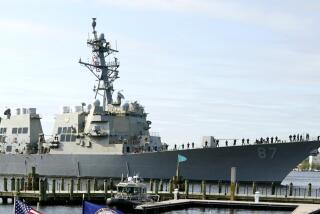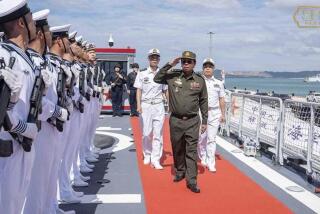International Business : ‘Phantom Ships’ Are Newest Twist in Piracy on East Asian Seas : Crime: Officials say $200 million in cargo is being hijacked every year.
- Share via
KUALA LUMPUR, Malaysia — “Phantom ships,” using fake documentation, are hijacking cargoes from ports across East Asia in the latest twist on piracy in the region, maritime officials said Wednesday.
“It is a problem which has accelerated,” said Eric Ellen, executive director of the Commercial Crime Services Division of the Britain-based International Chamber of Commerce.
At least $200 million worth of cargo is being hijacked every year by these phantom ships, Ellen told reporters after a two-day conference on piracy.
The International Maritime Bureau has investigated 20 phantom ships in recent years, including five ongoing cases. “It’s a tremendous problem for insurers,” a bureau official said.
Most of the pirate ships are registered in Honduras or Panama. They take cargoes easily disposed of, such as timber and minerals, IMB deputy director Jayant Abhyankar said.
In one of the latest cases, the Jeorge I sailed from China’s Ningbo port in February with a cargo of electrical cable bound for Jakarta, Indonesia, and has not been seen since.
In April, 1993, the cargo ship Harpers loaded timber in Indonesia that was destined for South Korea. After an investigation in six countries, the ship was found in Bangkok and the cargo tracked down in China, Abhyankar said.
“That’s a typical example of a phantom ship,” he said. “Since then, we’ve investigated four more cases.”
Overseas gangs of Chinese operating out of Taipei, Hong Kong, Singapore and Bangkok are running the phantom ships, Ellen said. “They’re experienced in shipping and documentation,” he said.
The gangs have an “underground banking system” and are heavily involved in smuggling people out of China, he said.
Law enforcement agencies have not yet figured out how to stop the menace, other than asking for crackdowns by countries where the ships are falsely registered.
“If they are unable or unwilling to investigate, then we must ask ourselves why are we allowing these flag states to continue” registering ships, Ellen said.
“But I don’t think it’s a major threat,” he said. The gangs “are not so greedy that they need to do more than five or six a year.”
Piracy of the more traditional kind, in which raiders plunder oceangoing vessels on the high seas, is on the decline, he said.
Only 42 cases were reported worldwide in the first six months of 1994, compared to 75 in 1993 and 83 the year before.
The seas around China, a hot spot last year, have been much safer this year since the regional piracy center in Kuala Lumpur called attention to Chinese naval vessels illegally detaining ships and confiscating cargo, Ellen said.
“There’s been quite a marked decline in piracy and illegal detention of ships in the South China Sea. No doubt this is due to action taken by the Chinese government,” he said.
Beijing has told maritime officials that in only a few instances was there any “misconduct” on the part of its naval forces. The other cases were anti-smuggling operations or pirates masquerading as Chinese naval personnel, Ellen said.
The Straits of Malacca have shown an even more dramatic decline in piracy.
The straits, which link the Indian Ocean to the South China Sea and the Pacific Ocean, were free of piracy last year after recording 200 cases in 1991, Ellen said. Malaysia, Indonesia and Singapore began joint patrols of the waterway nearly two years ago.
More to Read
Sign up for Essential California
The most important California stories and recommendations in your inbox every morning.
You may occasionally receive promotional content from the Los Angeles Times.













